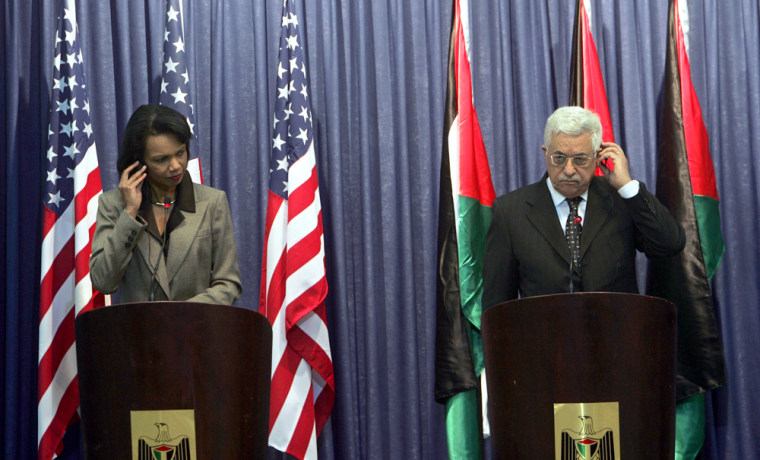President Bush’s top diplomat tried to assure Palestinians on Sunday she has heard their demands for a stronger U.S. hand to guide peace efforts with Israel. Secretary of State Condoleezza Rice, however, offered no new plans and gave few clues to how she views recent initiatives proposed by others.
“I have heard loud and clear the call for deeper American engagement in these processes,” she said after meeting with Palestinian President Mahmoud Abbas. “You will have my commitment to do precisely that.”
Seeking to strengthen Abbas in his power struggle with the Palestinian Hamas faction, Rice said it is time “to look at the political horizon and begin to show to the Palestinian people how we might move toward a Palestinian state.”
A proposed $85 million grant to train and equip the historically troubled security service loyal to Abbas would come with strings attached, Rice said. Abbas promised the money would not be misused.
The Palestinian leader, whose Fatah faction lost elections a year ago to the Islamic militants of Hamas, said the weapons were needed to impose order after weeks of Fatah-Hamas fighting that has killed 35 people.
The dispute has alarmed some of Abbas’ Arab neighbors, including Jordan’s King Abdullah II. Abdullah has warned of the possibility of three civil wars in the Middle East — in Iraq, the Palestinian territories and Lebanon — and asked for renewed U.S. diplomacy.
Skepticism from both sides
Despite signs of life in the moribund Israeli-Palestinian peace process, Rice encountered skepticism from both sides in two days of meetings with Israeli and Palestinian leaders.
Abbas rejected one idea Sunday that Israel considers promising: the establishment of a provisional Palestinian state in temporary borders.
Abbas also complained to Rice that Israel has not followed through on promises made at his much-awaited meeting with Israeli Prime Minister Ehud Olmert last month.
Israeli media reported that hardline deputy prime minister, Avigdor Lieberman, told Rice that the Israeli Army will have to re-enter the Gaza Strip at some point, and that 30,000 U.N. troops are needed to secure the chaotic Palestinian territory on Israel’s southern flank.
Lieberman has in the past said Israel should assassinate Hamas’ leadership, ignore the moderate Palestinian president and walk away from international peace efforts. His ideas do not necessarily carry weight, but Rice defended the decision to meet with him.
“I’m going to enlist the support of anybody I can to try and move forward a Palestinian state living at peace side by side with Israel,” Rice said. “That is the goal here.”
Lowering expectations
Rice tried to lower expectations for talks meant to help frame possible peace initiatives for Bush’s remaining two years in office. Various ideas under consideration would rearrange elements of a U.S.-backed peace plan dormant since its release in 2003.
Rice said the United States wants to “accelerate” the peace plan, but she has not given specifics.
The plan envisions a three-stage, three-year program to create an independent Palestinian state in the West Bank and the Gaza Strip. The step-by-step approach seeks specific concessions from both sides before moving to new issues, meaning it quickly can bog down if the conditions are not met.
Before Rice arrived, Israeli Foreign Minister Tzipi Livni had seemed to endorse the notion of skipping some of the elements of the plan’s first phase and jumping to the second phase, which would set up a placeholder state with temporary borders.
Livni gave a much vaguer description of that idea in a session with Rice on Saturday. Although Rice has not ruled it out, she has not explained how it would fit into the overall deal.
Palestinian officials in recent weeks have grown wary of the idea, believing it would enable Israel to usurp much of the West Bank, where Israel continues to build Jewish settlements.
“We oppose any temporary solutions, including a transitional stage, because we do not see it as a realistic option,” Abbas told a news conference in Ramallah after meeting with Rice.
Egyptian President Hosni Mubarak wrote the White House questioning whether the peace plan has outlived its usefulness and offering a counterproposal.
A presidential spokesman did not describe Mubarak’s proposal, but said the Egyptian leader would discuss it when Rice visits on Monday.
